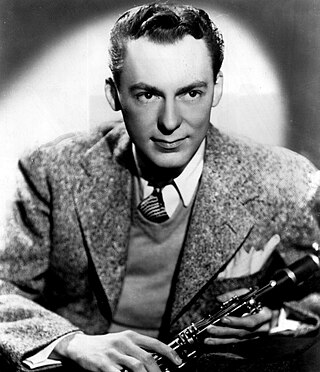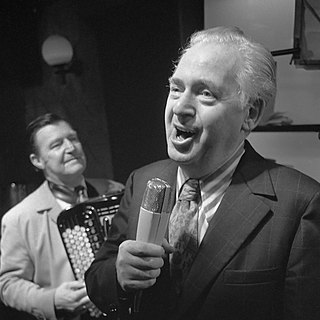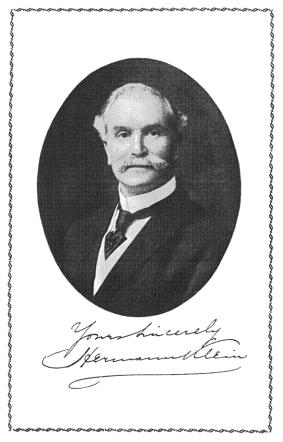
Gerald Sheldon Herman was an American composer and lyricist, known for his work in Broadway theatre.

Woodrow Charles Herman was an American jazz clarinetist, saxophonist, singer, and big band leader. Leading groups called "The Herd", Herman came to prominence in the late 1930s and was active until his death in 1987. His bands often played music that was cutting edge and experimental; their recordings received numerous Grammy nominations.
Herman Hupfeld was an American songwriter whose most notable composition was "As Time Goes By". He wrote both the lyrics and music.
Mack David was an American lyricist and songwriter, best known for his work in film and television, with a career spanning the period between the early 1940s and the early 1970s. David was credited with writing lyrics or music or both for over one thousand songs. He was particularly well known for his work on the Disney films Cinderella and Alice in Wonderland, and for the mostly-English lyrics through which Édith Piaf's signature song "La Vie en rose" gained much of its familiarity among native speakers of English.
Otto Clarence Luening was a German-American composer and conductor, and an early pioneer of tape music and electronic music.

Agathe Ursula Backer Grøndahl was a Norwegian pianist and composer. Her son Fridtjof Backer-Grøndahl (1885–1959) was also a pianist and composer, who promoted his mother's compositions in his concerts.

Emilio Eduardo de Gogorza was an American baritone singer.
"Blues in the Night" is a popular blues song which has become a pop standard and is generally considered to be part of the Great American Songbook. The music was written by Harold Arlen, the lyrics by Johnny Mercer, for a 1941 film begun with the working title Hot Nocturne, but finally released as Blues in the Night. The song is sung in the film by William Gillespie.
Michael Head, FRAM was a British composer, pianist, organist and singer who left some enduring works still popular today. He was noted for his association with the Royal Academy of Music. His compositional oeuvre mainly consists of songs, as well as choral works and few larger-scale pieces such as a piano concerto.

Lazarus 'Leo' Fuld was a Dutch singer who specialised in Yiddish songs.

Olga Averino was a Russian-born soprano and voice teacher. A white émigré to the United States in the wake of the Russian Civil War, she was prominent in the musical life of Boston for over 60 years, first as a singer and later as a distinguished voice teacher.
Klea Blackhurst is an American actress. She is best known for Everything the Traffic Will Allow, her tribute to Ethel Merman that debuted in New York in 2001. Among many accolades, this production earned her the inaugural Special Achievement Award from Time Out New York magazine. The recording of Everything the Traffic Will Allow was named one of the top ten show albums of 2002 by Talkin' Broadway.com.

Liza Lehmann was an English soprano and composer, known for her vocal compositions.

Herman Klein was an English music critic, author and teacher of singing. Klein's famous brothers included Charles and Manuel Klein. His second wife was the writer Kathleen Clarice Louise Cornwell, and one of their children was the writer Denise Robins.
The American Institute of Applied Music was a music school based in New York City. The Institute was incorporated in 1900 as an amalgamation (merger) of the following educational institutions:
- The Metropolitan College of Music
- The Metropolitan Conservatory of Music
- The Synthetic Piano School, and
- The American Institute of Normal Methods
Women in jazz have contributed throughout the many eras of jazz history, both as performers and as composers, songwriters and bandleaders. While women such as Billie Holiday and Ella Fitzgerald were famous for their jazz singing, women have achieved much less recognition for their contributions as composers, bandleaders and instrumental performers. Other notable jazz women include piano player Lil Hardin Armstrong and jazz songwriters Irene Higginbotham and Dorothy Fields.
Sunny Benjamin John, popularly known as S. B. John, was a singer from Karachi, Pakistan.

Masonic music has been defined as "music used in connection with the ritual and social functions of freemasonry". Two major types of music used in masonic lodges are lodge songs, played to keyboard accompaniment before or after meetings, or during meals; and music written to accompany specific masonic ceremonies and events. Because the number 3 and the letter 'B' are of particular significance to freemasonry, music written in the keys of C minor or E flat major, which both involve 3 flats,, in their key signatures has been considered especially appropriate for masonic ceremonial music.

Matja von Niessen-Stone was a Russian-born German concert singer. She sang with the Metropolitan Opera from 1908 to 1910.










